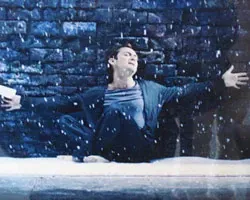Jude Law in 'Hamlet'
Written by

By James Hadley in London
Director Michael Grandage's fourth and final production in the Donmar Theatre's West End season is very much a star vehicle: Jude Law as a both casually playful and intense 'Hamlet'.
Like the more celebrated 'Hamlet' of David Tennant and the RSC last year/earlier this year, the director elected for a contemporary dress version. Although here the sombre costumes - in dark greys, purples, blacks and browns - dash around the monumental interior of an ancient stone castle amidst slants of smoke filled light, so it feels more timeless than recontextualised.
Jude Law, slouchily dressed, as commonly lounges on the floor to deliver a monologue as stands. It's a performance that seems to channel the energies of Arlecchino and a Brando-like angry young man in equal parts. At first I'm overwhelmed. By contrast with the sonorous declamations of Peter Evans, as the Ghost and Player King, Law's voice initially seems husky; lacking the edge and dynamism of a charismatic Shakespearean delivery. His intense and angsty playing of the Hamlet's initial scenes seems to leave little room to build to, I thought.
But instead his interpretation sees Hamlet soften as he moves into seeming madness. He toys with Polonius, dry humping him on the line about mistaking him for a fishmonger, then gathers Rosencrantz and Guildenstern around his feet like pupils rather than fellow students. There's a strong everyman quality to his performance that refreshes overly familiar aspects of the character. It's not a great interpretation, in the way that Kenneth Branagh's was, but there is certainly much humanity about it, and a marked contemporary individualism that make him easy to relate to.
There's nothing particularly showy about the production or interpretations, but perhaps this restraint from overt commentary or bold original statements gives the production greater integrity as a whole. Two huge wooden doors go from floor to ceiling upstage centre, and their opening and closing make for some nice formal punctuations in the staging. It's particularly striking when they open to reveal snow falling against a backdrop of a mauve-grey brick wall. Through this veil of snow Hamlet delivers his 'To be or not to be' soliloquy. This setting certainly accentuates the lyricism of the speech - with Hamlet sitting amidst the snowfall it's like an aria from 'La Boheme'.
The staging of the closet scene between Gertrude and Hamlet is notable for placing Polonius downstage of a huge white curtain, Gertrude and Hamlet lit so as to be visible behind it. Once Polonius has been stabbed, the curtain is dramatically dropped down to become his winding sheet. It's a moving moment, as Ron Cook's perfomance of Polonius was full of dry wit - easily one of the most likeable interpretations I've seen of this character.
I was all set to love Penelope Wilton as Gertrude - I once saw her play a stunning Ranyevskaya in 'The Cherry Orchard'. But she seemed to either be in a state of buttoned up courtly reserve, or so choked up with emotion that you could barely hear her. Somehow the production gave us little space to connect with her as a character.
Gugu Mbatha-Raw as Ophelia was also underwhelming - contained and pedestrian to the extent that you wondered what Hamlet saw in her beside prettiness. But her sung-through first mad scene was so affectingly delivered that it won me over, and the production did make Ophelia's madness seem wholly reasonable as a pyschological breakdown in the wake of her father's murder as much as Hamlet's changeable nature towards her. She wore white pyjamas in her final flower-giving scene, with the light shining right through the lower trouser legs in a way that somehow made her seem utterly vulnerable and impermanent.
The gravedigger scene was a revelation in its straight-forward playing. It's so existential, almost Absurdist; so modern. It feels like a scene from a play by Beckett. The playing here was perfection, with David Burke giving an earthy, salt-of-the-earth gravedigger, and Law making the famous 'Alas, poor Yorick' speech completely his own and devoid of cliches. I've never heard the speech delivered with such an understated, yet soulfully elegaic tone. Similarly outstanding was his delivery of the 'If it be now, tis not to come...' speech, which were particularly highlighted in this production, giving a clear sense of the character having moved from struggling against circumstances to an enlightened acceptance, which fitted well with the overall contemporary tone of the production's interpretation as a whole.